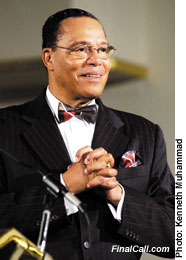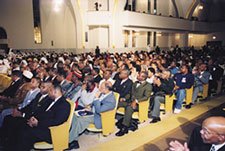
CHICAGO (FinalCall.com) – On the eighth anniversary of the historic Million Man March, the Honorable Minister Louis Farrakhan delivered a passionate message focused on the need for humanity to accept Allah (God) as the only leader to whom they should petition for guidance.
“This is the Lord’s Day. It’s not about a 24-hour period,” explained Min. Farrakhan to an audience at Mosque Maryam. “A day with the Lord is as a thousand years. And Christ’s reign is on the seventh day. That’s why you have a sect of Christianity called Seventh Day Adventists. An Adventist is one who believes in the advent, the coming to, or toward, of the Christ-figure in the 7,000 year from the birth or making of Adam.”
Tuned in via webcast, listeners in over 160 cities throughout America, the Caribbean, Mexico, and Europe heard his declaration that the wicked are not to rule today, and in fact, that this is the seventh dispensation in Time when God comes to take over the rule of the human family for Himself. However, he urged all those who wanted to be guided to the straight path of God in order to receive God’s favor to accept the process of cleaning up their lives through the eight steps of atonement.

The October 16 event marked eight years since nearly two million men gathered on the Mall in Washington, D.C., in the spirit of atonement to themselves, their families, their communities and their people, seeking forgiveness and reconciliation, and offering their lives in acceptance of their responsibility to uplift and advance themselves and their people. Their historic presence of peace and unity established the day as a Holy Day of Atonement.
Reflecting on that day as an “extraordinary day in our history,” Min. Farrakhan answered critics who tried to minimize the benefits of the March because the men did not petition the government on that day.
“That was not our purpose,” said Min. Farrakhan. “Had we gone there to petition Washington, we would have been giving Washington more credit than Washington is due. Washington cannot give what only God can give. To give Pharaoh credit is to rob God, as though a benevolent president can do more for us than God and we united with God can do for ourselves.”
“The Lord is my shepherd,” the Minister continued. “And it matters not what you do to me, I know that the Black man and the Red man and all human beings who wish to be free, will be free. But somebody has to be willing to pay that price. God does not want you, if you are unwilling to pay the price.”
He chided the audience on the divisions that keep Black people weakened, along political, ideological, religious organizations, saying that envy, jealousy, enmity and hatred mark the lack of progress. Positions in politics and corporate America cannot solve the problems of a nation, he pointed out, while stressing that a broader sight can help Black people to begin to think about what is in the best interest of the group, not a few individuals. “We have to see ourselves as a nation in another nation that does not have land sufficient that we can become self-independent,” the representative of the Honorable Elijah Muhammad noted.
In attendance to hear Min. Farrakhan’s address were Bishop Ki Hoon Kim representing the Unification Church; Reverend Al Sampson of Fernwood Methodist Church; Dr. Iva Carruthers; Rev. Dr. Maxine Walker, who was instrumental in organizing the local Million Man March committee; Professor Michael Lieb from the University of Illinois at Chicago; Erica Henry, wife of Reverend James Bevel, who was key in assisting Min. Farrakhan to develop the theme of atonement for the Million Man March; and a delegation representing the Hebrew Israelite Community.
After the three-hour lecture, several dignitaries offered their thoughts to The Final Call.
“I thought that Brother Farrakhan is putting a challenge out there for us to really, really focus on the issue of unity, in the spirit of the ndaba,” shared Dr. Carruthers, a staunch fighter for reparations for Black people. “To understand that only through unity will we be victorious and only focusing on the Will of God in our lives and righteousness. The struggle is not going to be an easy one. We will have to bear the cross to do that.”
Bishop Kim said that he was inspired by the wonderful lecture by Min. Farrakhan. “He talked about how we, fallen people, can go back to God and be good people and teachers to this country. He talked about how people can be saved.”
While Rev. Walker felt that eight years after the March, there still was much work to be done in the atonement process, she remained hopeful for the future after Min. Farrakhan’s lecture.
“One of the things that seems to be on his heart,” she opined, “was if he could just get men to repent. It’s so personal; it’s not something that they have to do to showcase themselves to man. If they could just humble themselves and prostrate themselves before Almighty God and repent to Him, because whatever you do that’s genuine on the inside is going to reflect on the outside. I think that’s what the Minister’s total message was tonight.
“For us as a people, to stop being fooled by one another, to stop playing with God and that all of us who say we want to see a new day, until we all come together in one faith and the unity of God, we will be drifting as we are now.”
A morning to remember
Despite a six-hour difference, members of the Nation of Islam in London, England, sat in deep concentration at 1 a.m. watching the address of Min. Farrakhan. Minister Hilary Muhammad shared with The Final Call his perspective on the atonement process, which he called an opportunity for the community to move forward, and for individuals to renew their commitment to Allah through each other.
“If there is an issue, we have to use the 12-month period to resolve it, as opposed to, on the Day of Atonement, resolving five-year issues,” he explained. “Instead of harboring ill feelings, if we don’t atone, it may lead to the pathology of hypocrisy. Your displeasure will be based upon a catalogue of incidents that have not been resolved.”
By fearing only Allah, as Min. Farrakhan taught in his address, it will be easy to approach one another in order to atone, which is essential in creating a family of believers, Min. Hilary added.
“You cannot go into Paradise with enmity in your heart for your brother and sister,” he concluded, “so those issues have to be resolved. Then, the community will be cleansed of hypocrisy, envy, jealousy, and ill feelings–all of these things that sap us of our power.”
A clear message from east to west
Throughout the mosques of the seven regions of the Nation of Islam, registered Muslims, community leaders and guests watched the webcast broadcast of Min. Farrakhan, from Miami to Memphis, New York to New Orleans, Detroit to Denver, San Francisco to Sacramento.
“Minister Farrakhan made it very clear that the Muslim community must spend more time reading and studying their Qur’an, and that we must truly practice Islam, not just its rituals,” said Sister Debra Kaliq, a member of the Nation of Islam for 36 years, who listened to the lecture at Harlem’s Mosque No. 7. “One of the most significant things he said was that the Black community was off the mark, how all of our institutions need to redeem themselves.”
“As any thinking and loving leader would do, he is thoughtfully giving us directions on how best to deal with these perilous times,” said Min. Kevin Muhammad, head of Mosque No. 7, adding that it was very important that Min. Farrakhan reminded us that separation between the Black and White people in America might very well prove necessary.
An audience of 400 filled the mosque in Washington, D.C., many of whom remained to fellowship after the lecture.
“Minister Farrakhan reminded us of what the Honorable Elijah Muhammad said many years ago that is still true,” said Minister Abdul Khadir Muhammad, the Mid-Atlantic and East Coast Regional Minister. “He said that we would never get justice from our open enemy. The Minister reminded us that for justice we must separate and build a house of our own.”
Sis. Jennifer A. Muhammad, an urban planner from San Francisco, who heard the message in D.C., shared what she learned from the lecture. “God doesn’t want us if we’re not willing to pay the price of redemption. God will do His part if we are willing to do our part. The Minister is an example to us on what it means to do our part,” she said. “I was inspired by his words that we have to be willing to give something up to do this work. The Minister is willing to give his life to see Black people be free.”
Prior to the 7 p.m. lecture by Min. Farrakhan, the members of the mosque in Los Angeles accepted the invitation from the Western Regional Minister Tony Muhammad to come to the mosque to engage in the atonement process with one another, before finalizing preparations for the lecture, which was viewed by over 500 people.
Five hundred people also came to the mosque in Houston, Texas. Earlier that day, the Southwest Regional Minister Robert Muhammad gave a lecture about atonement to nearly 900 students at the Alphonso Crutch charter school. Similar community outreach and education efforts occurred in Miami, Florida, where Seventh Regional Minister Rasul Muhammad and other mosque officials visited various homeless shelters and prisons to deliver a message on atonement.
“Min. Farrakhan was very clear on the enemy’s objective, and he gave us something very profound that will enable us to survive–the 23rd Psalm in the Bible,” the head of Muhammad Mosque No. 25 in Newark, New Jersey, Min. Michael Muhammad told The Final Call. “He made it clear that the Honorable Elijah Muhammad placed himself in Allah’s hands as his Shepherd, and we need to do the same.”
“Many of those in attendance said that they were moved by Min. Farrakhan’s spirit, and that they felt compelled to fall in line with the program of the Hon. Elijah Muhammad,” he noted.
“Min. Farrakhan always puts the focus back on the mission of the Nation of Islam,” Min. Jerry Muhammad of Study Group No. 57 in Norfolk, Virginia, said. “He was able in his address to renew our spirit to become more committed to the meaning of the Million Man March and the Holy Day of Atonement.”
(Saeed Shabazz and Nisa Islam Muhammad contributed to this story.)












